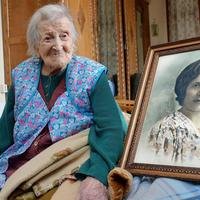A few months ago I woke up to the news of Emma Morano’s birthday. She turned 117 years old on November 29 in Verbania, Italy, where she has lived for her entire life. She is now the world’s oldest woman, and the newspapers gave special attention to this event and Emma was described as the Italian heroine of that day. Several journalists from different parts of Europe went to visit and to interview her, all with the aim of understanding her “secret”, the key to a long and healthy life. This is the first question that everyone wants to ask very old individuals who are still in good health: how is it possible to reach their age in a good condition? Speaking with the Agence France-Presse[1], Morano revealed the secret of her longevity: two eggs and few cookies a day[2]!
A good diet (which might be different from Morano’s secret!) is definitely a good way to stay healthy over the years, but there are now lots of evidence to show that other factors are crucial for a long and healthy life. There is no doubt that innovations in medicine and technology can do a lot to improve the lives of individuals who are – in conventional terms – already old, but there is now a great deal of evidence to show how events that happen earlier in our life strongly shape our later health and wellbeing.
For this reason, social sciences have started to adopt longitudinal and life-grid approaches to study this topic. The first approach involves repeated observations of the same individuals over long periods of time, while in the second approach the information of individuals is collected retrospectively (usually on an annual basis). Thanks to these strategies, we are able to collect specific information about an individuals’ life in different domains (health, family, work, social network …). For example, we could know which kinds of job an individual had during his/her life, if he/she was married and had children, or if he/she experienced specific diseases over the years. Sophisticated statistical techniques allow us to put this information together and to understand the nature of the associations between different factors and eventual outcomes.
Using these approaches, several studies have shown that adverse employment circumstances, including poor social and psychological working conditions, increase the risk of mental disorder and poor quality of life in old age[3]. In Europe, for example, it has been found not only that continuous employment histories guarantee higher quality of life in late ages, but also that this association is more pronounced in men than women[4]. Indeed, differences between genders are particularly strong, since men and women have very different employment histories. Men’s careers are often characterised by long periods of continuous employment which end in retirement with only occasional periods of unemployment or domestic work. Women, on the other hand, are likely to have unstable or fragmented work careers, due to their involvement in domestic work and children’s care.
These distinctive gender patterns in employment make it relatively easy to detect gender differences in the association between employment trajectories and wellbeing. In his recent study, Wahrendorf (2015) found that men have a higher quality of life if they had a regular employment history and retired later. The earlier men retire, the higher their risk of poor quality of life in retirement. Lower wellbeing was also found among those who end their career in unemployment and in domestic work. A different picture is depicted in the case of women. The highest wellbeing was found among women who interchanged periods of domestic work with employment experience. Women who had a continuous employment history ending up in relatively late retirement tended to have a lower quality of life. In a nutshell, women (differently from men) were more at risk in their later life if their employment histories were characterised either by continuous employment or continuous domestic work.
The results found in studies like these underline the importance of taking a longitudinal approach to observing the life of individuals. They also remind us that we may find very major differences between men and women. To gain a better understanding of the influences on wellbeing in later life, researchers have to cast their net wide to incorporate other kinds of factors and their potential inter-relations, such as the association between family circumstances, health problems episodes and social networks.
There is one important aspect of this complex research agenda which is still very much under investigation: the role of institutions and values. Countries have different social and labour market policies, cultural values and gender specificities that could affect differently the wellbeing of individuals. The increase in the number of old people (and in the average age of the population) compels governments to develop specific strategies to guarantee a good support of old population. In order to design these strategies, it is crucial to have a broad view and to consider the many ways in which the future depends on the present: an informed focus on the (work, family, social …) conditions of younger adults might pay dividends by improving their life when they get old.
[1] https://www.youtube.com/watch?v=HlB0pIgt0Og.
[2] https://www.youtube.com/watch?v=HlB0pIgt0Og ; http://www.huffingtonpost.com/entry/worlds-oldest-woman-116-reveals-the-one-food-she-eats-every-day_us_5817613ae4b0990edc323fb5 .
[3] Stansfeld, S. A., Shipley, M. J., Head, J. and Fuhrer, R. 2012. Repeated job strain and the risk of depression: longitudinal analyses from the Whitehall II Study. American Journal of Public Health, 102, 12, 2360-6.
[4] Wahrendorf, M. 2015. Previous employment histories and quality of life in older ages: sequence analyses using SHARELIFE. Ageing & Society, 35, 1928 – 59.
About the Author:
Dr Sara Zella is a Research Fellow at the Oxford Institute of Population Ageing. Sara joined the Institute in 2016 to work with Professor Sarah Harper on the research project “The impact of different work/care life courses on women’s wellbeing and quality of life in early retirement and the welfare regimes which help shape this”.
Comments Welcome:
We welcome your comments on this or any of the Institute's blog posts. Please feel free to email comments to be posted on your behalf to administrator@ageing.ox.ac.uk or use the Disqus facility linked below.
Opinions of the blogger is their own and not endorsed by the Institute
Comments Welcome: We welcome your comments on this or any of the Institute's blog posts. Please feel free to email comments to be posted on your behalf to administrator@ageing.ox.ac.uk or use the Disqus facility linked below.













